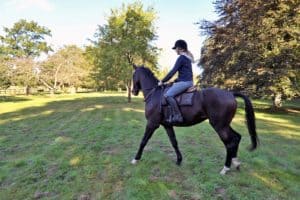
Product Review: Alimend Gastric Health Supplement for Horses
Alimend, a gastric health supplement made by Vitalize, has helped ease an off-track Thoroughbred gelding’s gastric discomfort and keep it at bay over the past 15 months.


Alimend, a gastric health supplement made by Vitalize, has helped ease an off-track Thoroughbred gelding’s gastric discomfort and keep it at bay over the past 15 months.

Dr. Marc Koene’s Sunrise Session is a can’t-miss presentation at the AAEP Convention, where he will be describing the 2.5% polyacrylamide hydrogel’s history and his strategy and case selection using it.

The decision about riding horses recovering from EPM and other diseases, one vet says, involves balancing rider safety, liability concerns, and animal welfare.

Cervical vertebral malformation and EPM can cause neurologic disease in horses at the same time.

Pathologists detected S. neurona DNA in preserved tissue from horses with acute and chronic neurologic disease, with and without EPM treatment history.

Our editorial director addressed mild hindquarter atrophy in her Thoroughbred with KPP’s Elevate Natural Vitamin E.

Once-weekly Protazil administration achieved steady-state plasma concentrations known to inhibit S. neurona, which causes EPM in horses.

Performing a serum:cerebrospinal fluid titer ratio to confirm/rule out EPM in horses (versus treating without that test) substantially decreased cost for the owner.

A veterinary sports medicine and rehab specialist describes what we know about orthobiologic therapies for OA in horses and their high likelihood for variable responses.

Sometimes we get our horses in trouble with the very items we use to help them be more comfortable.

Let us not forget to pause to consider the basics when our horses are telling us something about their health.

Dr. Uneeda Bryant describes how veterinary pathologists safeguard horse populations, determine causes of death, and protect the human-animal bond.

Prepurchase exams are an important part of equine practice. A veterinarian recommends how to achieve the best outcomes.

Dr. Lutz Goehring weighs in on what researchers have learned about equine herpesvirus-1, how it spreads, and how to prevent infection.

Dr. Carrie Shaffer of the University of Kentucky describes how in vitro models will help us better understand how we can prevent and fight disease in horses.

Dr. Steve Higgins of the University of Kentucky optimizes daily barn tasks for efficiency, cost savings, and environmental soundness.
Stay on top of the most recent Horse Health news with
© 2022 Copyright Statement dolor sit amet, consetetur sadipscing User Terms, sed diam nonumy eirmod tempor invidunt ut labore et dolore magna aliquyam erat, sed diam voluptua. At vero eos et accusam et justo duo dolores et ea rebum. Stet clita kasd gubergren, no sea takimata sanctus est Lorem ipsum dolor sit amet.